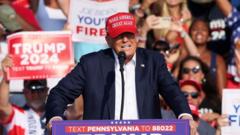Lula defends Brazil's sovereignty and economic integrity, calling out inaccuracies in Trump's claims.
Brazil Ready to Counter US Tariffs Amid Trump's Threats of 50% Levy

Brazil Ready to Counter US Tariffs Amid Trump's Threats of 50% Levy
Brazilian President Lula assures reciprocal tariffs in response to Trump's proposed import tax.
Brazilian President Luiz Inácio Lula da Silva has pledged to respond in kind to any tariffs proposed by the United States, following a significant threat from US President Donald Trump to implement a 50% import tax on Brazilian goods starting August 1. Trump's warning came in a letter citing Brazil's treatment of former President Jair Bolsonaro, who is currently facing trial for allegedly attempting to incite a coup against Lula after losing the 2022 elections.
In his correspondence, Trump, who has historically aligned himself with Bolsonaro, characterized the former leader as "a highly respected figure worldwide." He condemned the ongoing legal proceedings against Bolsonaro, asserting that they should cease and accusing Brazil of conducting a "witch hunt" against him. Trump's discontent with Brazil's judiciary echoes his own legal struggles within US courts.
Lula's reaction was firm; in a post on X, he underscored Brazil's sovereignty and the independence of its institutions, asserting that the country would not tolerate any form of external authority. In response to potential tariff increases, Lula affirmed that Brazil would impose equivalent tariffs on US goods, putting economic pressure on the bilateral relationship, as the US is Brazil's second-largest trading partner, following China.
Contrary to Trump's claims regarding a trade deficit with Brazil, Lula advocated for more accurate representations of trade dynamics, noting that US government data indicates a $7.4 billion goods trade surplus for the US with Brazil in 2024. President Lula's administration has emphasized that pertinent imports to the US include vital resources such as mineral fuels, machinery, and aircraft, while Brazil imports energy products, iron, and coffee from the US.
Besides Brazil, Trump also hinted at imposing higher tariffs on other nations, including Japan, South Korea, and Sri Lanka, but his letter to Brazil uniquely addressed Bolsonaro's situation. Trump also criticized Brazil’s legal actions against social media platforms, arguing they amounted to unlawful censorship. Lula defended the judicial decisions, stating they reflect societal rejection of hate speech and violations against human rights.
Experts suggest that Trump's politically charged remarks might inadvertently enhance Lula's domestic standing, potentially leading to increased support for his administration. Political analysts note that historical precedents show that leaders confronted by Trump's rhetoric often gain popularity within their own countries. The effectiveness of Lula's response to the situation, however, may vary based on how unified and strategic his administration remains in countering Trump's claims.
In his correspondence, Trump, who has historically aligned himself with Bolsonaro, characterized the former leader as "a highly respected figure worldwide." He condemned the ongoing legal proceedings against Bolsonaro, asserting that they should cease and accusing Brazil of conducting a "witch hunt" against him. Trump's discontent with Brazil's judiciary echoes his own legal struggles within US courts.
Lula's reaction was firm; in a post on X, he underscored Brazil's sovereignty and the independence of its institutions, asserting that the country would not tolerate any form of external authority. In response to potential tariff increases, Lula affirmed that Brazil would impose equivalent tariffs on US goods, putting economic pressure on the bilateral relationship, as the US is Brazil's second-largest trading partner, following China.
Contrary to Trump's claims regarding a trade deficit with Brazil, Lula advocated for more accurate representations of trade dynamics, noting that US government data indicates a $7.4 billion goods trade surplus for the US with Brazil in 2024. President Lula's administration has emphasized that pertinent imports to the US include vital resources such as mineral fuels, machinery, and aircraft, while Brazil imports energy products, iron, and coffee from the US.
Besides Brazil, Trump also hinted at imposing higher tariffs on other nations, including Japan, South Korea, and Sri Lanka, but his letter to Brazil uniquely addressed Bolsonaro's situation. Trump also criticized Brazil’s legal actions against social media platforms, arguing they amounted to unlawful censorship. Lula defended the judicial decisions, stating they reflect societal rejection of hate speech and violations against human rights.
Experts suggest that Trump's politically charged remarks might inadvertently enhance Lula's domestic standing, potentially leading to increased support for his administration. Political analysts note that historical precedents show that leaders confronted by Trump's rhetoric often gain popularity within their own countries. The effectiveness of Lula's response to the situation, however, may vary based on how unified and strategic his administration remains in countering Trump's claims.




















